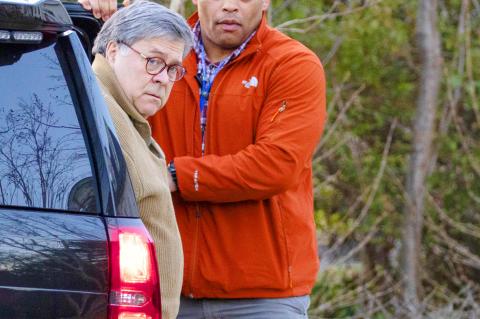US Attorney General William Barr has scoured Special Counsel Robert Mueller’s confidential report on the Russia investigation with his advisers, deciding how much the US Congress and the public will get to see about the two-year probe into US President Donald Trump and Moscow’s efforts to elect him.
Barr was on pace to release his first summary of Mueller’s findings later yesterday, people familiar with the process said.
His decision on what to finally disclose seems almost certain to set off a fight with congressional Democrats, who want access to all of Mueller’s findings — and supporting evidence — on whether Trump’s 2016 campaign coordinated with Russia to sway the election and whether the president later sought to obstruct the investigation.

Photo: Bloomberg
Barr and US Deputy Attorney General Rod Rosenstein, who appointed Mueller and oversaw much of his work, analyzed the report on Saturday, laboring to condense it into a summary letter of main conclusions.
Mueller delivered his full report to Barr on Friday.
The Russia investigation has shadowed Trump for nearly two years and has ensnared his family and close advisers.
No matter the findings in Mueller’s report, the probe already has illuminated Russia’s assault on the US political system, painted the Trump campaign as eager to exploit the release of hacked Democratic e-mails to hurt Democratic candidate Hillary Rodham Clinton and exposed lies by Trump aides aimed at covering up their Russia-related contacts.
Barr has said he wants to release as much as he can under the law.
That decision would require him to weigh the US Department of Justice’s longstanding protocol of not releasing negative information about people who are not indicted against the extraordinary public interest in a criminal investigation into the president and his campaign.
Democrats are already citing the department’s recent precedent of norm-breaking disclosures, including during the Clinton e-mail investigation, to argue that they are entitled to
Even with the details still under wraps, Friday’s end to the 22-month probe without additional indictments by Mueller was welcome news to some in Trump’s orbit who had feared a final round of charges could target more Trump associates or members of the president’s family.
The White House sought to keep its distance, saying on Saturday it had not been briefed on the report.
Trump, who has relentlessly criticized Mueller’s investigation as a “witch hunt,’’ went golfing and was uncharacteristically quiet on Twitter.
US House of Representatives Speaker Nancy Pelosi said in a letter to members that Barr’s offer to provide a summary of principal conclusions was “insufficient.”
Pelosi later told Democrats on a conference call that she would reject any kind of classified briefing on the report and that the information must be provided to Congress in a way that would allow lawmakers to discuss it publicly.
A Justice Department official did confirm that Mueller was not recommending any further indictments, meaning the investigation had ended without any public charges of a criminal conspiracy, or of obstruction of justice by the president.

Nvidia Corp yesterday unveiled its new high-speed interconnect technology, NVLink Fusion, with Taiwanese application-specific IC (ASIC) designers Alchip Technologies Ltd (世芯) and MediaTek Inc (聯發科) among the first to adopt the technology to help build semi-custom artificial intelligence (AI) infrastructure for hyperscalers. Nvidia has opened its technology to outside users, as hyperscalers and cloud service providers are building their own cost-effective AI chips, or accelerators, used in AI servers by leveraging ASIC firms’ designing capabilities to reduce their dependence on Nvidia. Previously, NVLink technology was only available for Nvidia’s own AI platform. “NVLink Fusion opens Nvidia’s AI platform and rich ecosystem for

‘WORLD’S LOSS’: Taiwan’s exclusion robs the world of the benefits it could get from one of the foremost practitioners of disease prevention and public health, Minister Chiu said Taiwan should be allowed to join the World Health Assembly (WHA) as an irreplaceable contributor to global health and disease prevention efforts, Minister of Foreign Affairs Lin Chia-lung (林佳龍) said yesterday. He made the comment at a news conference in Taipei, hours before a Taiwanese delegation was to depart for Geneva, Switzerland, seeking to meet with foreign representatives for a bilateral meeting on the sidelines of the WHA, the WHO’s annual decisionmaking meeting, which would be held from Monday next week to May 27. As of yesterday, Taiwan had yet to receive an invitation. Taiwan has much to offer to the international community’s

CAUSE AND EFFECT: China’s policies prompted the US to increase its presence in the Indo-Pacific, and Beijing should consider if this outcome is in its best interests, Lai said China has been escalating its military and political pressure on Taiwan for many years, but should reflect on this strategy and think about what is really in its best interest, President William Lai (賴清德) said. Lai made the remark in a YouTube interview with Mindi World News that was broadcast on Saturday, ahead of the first anniversary of his presidential inauguration tomorrow. The US has clearly stated that China is its biggest challenge and threat, with US President Donald Trump and US Secretary of Defense Pete Hegseth repeatedly saying that the US should increase its forces in the Indo-Pacific region

ALL TOGETHER: Only by including Taiwan can the WHA fully exemplify its commitment to ‘One World for Health,’ the representative offices of eight nations in Taiwan said The representative offices in Taiwan of eight nations yesterday issued a joint statement reiterating their support for Taiwan’s meaningful engagement with the WHO and for Taipei’s participation as an observer at the World Health Assembly (WHA). The joint statement came as Taiwan has not received an invitation to this year’s WHA, which started yesterday and runs until Tuesday next week. This year’s meeting of the decisionmaking body of the WHO in Geneva, Switzerland, would be the ninth consecutive year Taiwan has been excluded. The eight offices, which reaffirmed their support for Taiwan, are the British Office Taipei, the Australian Office Taipei, the